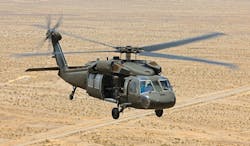Sikorsky to build additional UH-60M military helicopters, avionics, and sensors in $443 million order
REDSTONE ARSENAL, Ala. – The U.S. Army is ordering UH-60M Black Hawk helicopters from Sikorsky Aircraft Corp., a Lockheed Martin company in Stratford, Conn., under terms of a $443 million order announced on Tuesday.
Officials of the U.S. Army Contracting command at Redstone Arsenal, Ala., are asking Sikorsky to build UH-60M Black Hawk helicopters. This order is part of a $2.3 billion contract awarded last year for 120 UH-60M helicopters, with options for an additional 135 aircraft.
The UH- and HH-60 is the Army’s utility tactical transport helicopter that provides air assault, general support, aeromedical evacuation, command and control, and special operations support. This Black Hawk serves as the Army’s utility helicopter in the Future Force.
The UH-60M includes the improved GE-701D engine and provides greater cruising speed, rate of climb, and internal load than the UH-60A and UH-60L versions.
The twin-engine UH-60M Black Hawk, the newest model of the Black Hawk family, can serve in extreme conditions, and is designed to replace the older UH-60A Black Hawk. It is the centerpiece of the Army's long-term effort to modernize the service's medium-lift helicopter fleet. Sikorsky has manufactured the Army Black Hawk since 1978.
The medical evacuation (MEDEVAC) HH-60M includes an integrated MEDEVAC mission equipment package kit, providing day, night and adverse weather emergency evacuation of casualties.
The cockpit avionics of the UH-60M helicopters include multi-function displays; flight management systems; modern flight control computers with fully coupled autopilot; an integrated vehicle health management system with flight data and cockpit voice recorder; inertial navigation systems with embedded global positioning systems; improved data modem; and improved heads-up displays. The narrower cockpit instrument panel will also significantly improve chin window visibility.
The UH-60M has improved rotor blades, modern electronic instruments, flight controls, and aircraft navigation control. It has a zero-vibration system, adaptive flight control laws, advanced fire management, a durable main rotor, crashworthiness, and damage-tolerant airframe.
The helicopter has advanced digital avionics, including the Integrated Area Navigation (I-RNAV), which provides the helicopter with certified flight management system software to enable aircraft to perform required navigation performance approaches, increasing the unit’s capabilities to handle missions under instrument flight rules.
Some of the newest models of the UH-60M reportedly have nose-mounted sensors that are part of the helicopter's new Degraded Visual Environment Pilotage System (DVEPS), which helps pilots fly safely through clouds of dust, sand, snow, and fog.
The UH-60M can fly as fast as 151 knots at altitudes to 15,180 feet to distances as far as 276 nautical miles between refueling. The UH-60M's new composite spar wide-chord blade provides 500 pounds more lift than the UH-60L blade. The General Electric T700-GE- 701D engine will add more horsepower and allow additional lift during external sling load operations.
Sikorsky and the Army have had the UH-60M in full-rate production since late 2007, and by early 2009 the company had delivered it first 100 UH-60M rotorcraft to the Army.
On this contract Sikorsky will do the work in Stratford, Conn., and should be finished by June 2027. For more information contact Sikorsky, a Lockheed Martin company, online at www.lockheedmartin.com/en-us/capabilities/sikorsky.html, or the Army Contracting Command-Redstone at https://acc.army.mil/contractingcenters/acc-rsa/.
